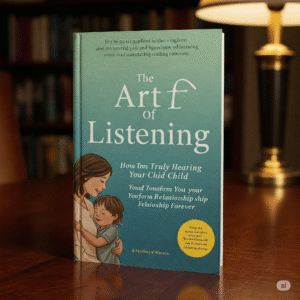When Dreams Collide: Reflecting on the Cost of Forcing Children to Follow Parents’ Desires

A heartfelt reflection on the unseen emotional cost children bear when forced to live out their parents’ dreams.
CHARACTER LEARNING – When I was a child, I thought success meant making my parents smile. If they were proud, I was doing the right thing. If they praised me, I felt worthy. It took years—decades, even—to untangle that belief and realize that chasing their dreams for me had led me to lose sight of my own.
I’ve seen this story play out in so many lives, in different forms. A young girl pushed into medicine though she loved literature. A boy discouraged from art because “there’s no money in that.” A teenager studying law to honor his father’s legacy, even though every fiber of his being longed to be an engineer. These stories share a common thread: the well-meaning intentions of parents colliding with the quiet, unspoken dreams of their children.
It’s easy to understand where the parents are coming from. They love their children. They want them to be safe, successful, respected. For many parents, their children’s achievements are a reflection of their own sacrifices and worth. So they guide. They suggest. They sometimes push, not realizing that their gentle nudges can become heavy burdens on small shoulders.
But good intentions don’t erase the weight of expectations.
Children are not vessels to carry out unfinished dreams or compensate for past regrets. They are not extensions of their parents’ identities. They are individuals—messy, curious, passionate, and wholly unique. And yet, too often, their own voices are silenced before they are even allowed to speak.
I remember talking to a friend once, a brilliant pianist whose heart was never in music. She had been enrolled in lessons since the age of four, competed nationally, and earned a scholarship to a prestigious music school. But every note she played felt like an obligation. Her real love? Architecture. She confessed that she would sketch buildings in the margins of her sheet music, just to feel like herself again.
Her story struck me deeply. Not because it was rare, but because it wasn’t.
When children are steered too forcefully down a path that isn’t theirs, several things can happen. Some grow resentful, developing a quiet anger toward their parents that simmers beneath the surface. Others learn to suppress their desires so completely that they forget who they are. And some, the most tragic of all, succeed in everything they were told to do—only to look back and realize they lived a life that was never truly theirs.
This doesn’t mean guidance is wrong. Of course parents should provide structure, wisdom, and support. Children aren’t born knowing the world. But there is a fragile balance between guiding and controlling. Between advising and dictating. And when that balance tips too far, the child’s autonomy is lost.
So how do we know the difference?
Maybe it begins with listening. Not listening to respond or correct, but listening to understand. It means asking, “What do you want?” and truly being open to the answer, even if it’s not what we hoped to hear.
It also requires humility—the kind that says, “Maybe I don’t know what’s best for someone else’s soul, even if that someone is my own child.”
Letting go of control doesn’t mean letting go of love. In fact, it might be the deepest form of love there is: the kind that says, “I trust you to become who you are, not who I need you to be.”
I’ve seen parents make this shift. I’ve seen a mother put aside her dreams of a “doctor daughter” to support her child’s dream of becoming a filmmaker. I’ve seen a father wrestle with his pride to accept that his son didn’t want to inherit the family business, but wanted to teach kindergarten instead. It’s not easy. It’s not clean. But it’s beautiful.
And on the other side of that decision, I’ve seen children flourish—not just because they were allowed to chase their dreams, but because they knew they were loved unconditionally.
I often wonder how different the world might be if more people were living out of love rather than obligation. How many silent artists, would-be writers, or curious scientists never emerged because they were told, subtly or overtly, that their dreams weren’t good enough?
We lose something when we ignore who our children really are. And worse, they lose something too. Their confidence. Their voice. Sometimes even their joy.
I’m not a parent myself, but I was a child once. A child who spent a long time trying to earn approval by being someone I wasn’t. And I wish someone had told me earlier that it was okay to choose a different path.
If you’re a parent reading this, I invite you to reflect, not with guilt, but with honesty. Are you guiding your child, or are you steering them toward your own reflection? Are you supporting who they are, or molding them into someone you wish you had been?
The truth is, your child was never meant to live your life. They were meant to live theirs—with your love as the safety net, not the script.
Let’s raise children who aren’t afraid to dream their own dreams—even if those dreams look nothing like ours.[*]

